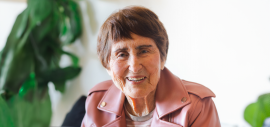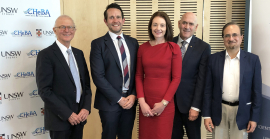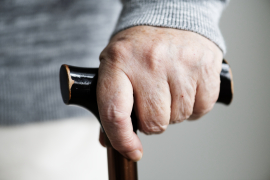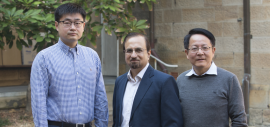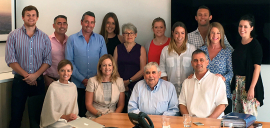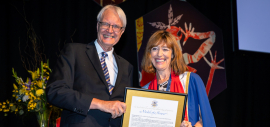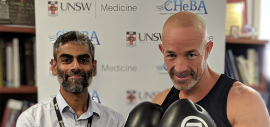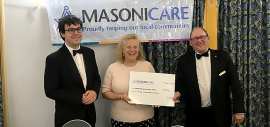Blog: The Brain Dialogues, filtered by tag: Professor Perminder Sachdev AM
PhD Students Excel at CHeBA
HEIDI DOUGLASS | h.douglass@unsw.edu.au
The breadth of research groups and studies at CHeBA make it a leader in the global epidemiology of dementia, with the data available making the Centre a rich resource for not just researchers, but also students.
According to the Co-Directors of CHeBA, Professor Perminder Sachdev and Professor Henry Brodaty, the calibre of students the Centre has supported has been outstanding.
Recent PhD graduate, Dr Rebecca Koncz, is no exception. Dr Koncz led a world first study using data from CHeBA’s long-standing Older Australian Twins Study, using a brain… Read More
The Keys to Growing Old Well
HEIDI DOUGLASS | h.douglass@unsw.edu.au
Across the globe, people are fascinated and intrigued by centenarians – the group of incredible human beings that defy the odds and live to 100 and beyond. Over the last 20 years, the number of Australians who were living to over 85 years of age has risen by 110%; an extraordinary increase and begs the question as to whether this trajectory will continue.
Sydney near-centenarian Mrs Patricia Segal is the hallmark of positive ageing. She is a participant in CHeBA’s Sydney Centenarian Study which explores the genetic and environmental determinants of… Read More
KPMG Sydney Commits to Ongoing Support for The Dementia Momentum
HEIDI DOUGLASS | h.douglass@unsw.edu.au
In-kind partner of The Dementia Momentum since 2015, KPMG Sydney, has committed to continued partnership to support the initiative led by UNSW Sydney’s Centre for Healthy Brain Ageing (CHeBA).
The Dementia Momentum celebrated its anniversary with KPMG Sydney hosting an exclusive lunch for major donors and corporate partners of the initiative at their Barangaroo offices on Wednesday, 2 June 2021. The event, which was the first to be held for The Dementia Momentum since the global pandemic began and sponsored by private markets finance and investment… Read More
No Place for Ageism in our Society
PROFESSOR PERMINDER SACHDEV AM | p.sachdev@unsw.edu.au
For the more than 700 million people in the world aged over 65, often considered ‘old’ in our society, 2020 has been a landmark year. The misery wrought by the pandemic has preferentially targeted this age group, with those over 70 being five times more likely to die from COVID-19 than the general population [1].
In countries with uncontrolled infections, older persons have faced discrimination in decisions relating to triage and life-saving interventions. The poor state of our aged care homes was highlighted by the fact that about four… Read More
J Holden Family Foundation Advances Neuroimaging Research
HEIDI DOUGLASS | h.douglass@unsw.edu.au
“Brain age” is an emerging hot research topic in brain ageing research. Brain age refers to an estimate of “how old a person’s brain is biologically”, representing actual brain health status. For example, a person aged 80 years old may have a healthier brain and more intact brain structures relative to his/her age. In this case, a younger brain age of, for example, 70 will be assigned. By doing so, one can assess the brain’s health relative to chronological age. Research can also be conducted by examining the protective factors in the individuals with… Read More
Inter-Generational Family Foundation
HEIDI DOUGLASS | h.douglass@unsw.edu.au
Multigenerational giving provides meaningful opportunities to bring family members together to support common causes, give back to communities, and create lasting change; a concept that is well understood by the Mostyn family in Sydney.
Three generations of the Mostyn family work collectively to provide funding support for valuable projects, while modelling social values to younger generations and raising awareness of community needs.
The Mostyn Family Foundation was founded by Bob Mostyn in 2011 with support of his sons Richard, Andrew and Robert… Read More
School of Psychiatry Academics Recognised by the Royal Australian and New Zealand College of Psychiatry (RANZCP)
HEIDI DOUGLASS | h.douglass@unsw.edu.au
Two of UNSW’s School of Psychiatry and Centre for Healthy Brain Ageing (CHeBA) academics, Professor Brian Draper and Professor Julian Trollor, were acknowledged for significant contributions to psychiatry at the recent RANZCP Congress held on Monday, 13th May 2019.
Professor Brian Draper, a Chief Investigator on CHeBA’s Sydney Memory & Ageing Study, was awarded the RANZCP’s College Medal of Honour for his outstanding contribution to psychiatry as a clinician and researcher, and for his extensive and continuous service to the RANZCP. Established in… Read More
Does Social Interaction Reduce Risk of Dementia?
DR ANNE-NICOLE CASEY
How people interact with and perceive one another, and each person’s thoughts and feelings about the quality of those interactions and relationships, can affect physical and mental health and well-being. Social cognitive function, which broadly refers to the way our brain processes social information, is recognised as an important marker of how efficiently our brain processes information in general1. Interestingly, the number of individuals with whom a person interacts frequently is associated with their short-term memory capacity2. Some studies report that having larger… Read More
Adventure Seeker Honours Dad's Fight With Dementia
HEIDI DOUGLASS | h.douglass@unsw.edu.au
Martin Gregory is an adventure seeker. He has travelled 400 miles inside the Arctic Circle with a team of 8 dogs, scaled Cotapaxi Volcano in Ecuador, travelled 4,200 kilometres across Africa, travelled 1,200 kilometres through the Himalayas and trekked across the Owen Stanley Mountain range on the infamous Kokoda Track.
Clearly, Martin enjoys a challenge but 2 years ago he was faced with one of his greatest challenges to date when father Richard Paul Gregory was diagnosed with dementia.
Born in 1938 near Birmingham, ‘Paul’, as he was known… Read More
MasoniCare & Lodge Harold Herman Unity Support CHeBA
HEIDI DOUGLASS | h.douglass@unsw.edu.au
The Worshipful Master from Lodge Harold Herman Unity, Very Worshipful Brother Mark Arenson, presented a $4,000 cheque to Ms Angie Russell, CHeBA’s Centre Manager, on 26 September 2018 at the Laurelbank Masonic Centre in Willoughby.
Very Worshipful Brother Mark Arenson said he was delighted with the funds raised at their inaugural trivia night on Saturday, 11 August and felt it was important for community groups to learn more about dementia and support advances in research.
“This was the first time we had applied for a MasoniCare grant,” Lodge… Read More

